National
Will Obama include gay couples in immigration reform?
White House sounds amenable, but divided Congress an obstacle
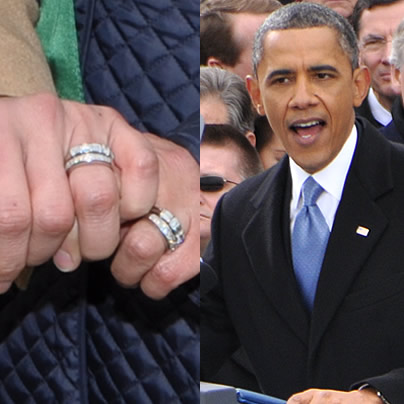
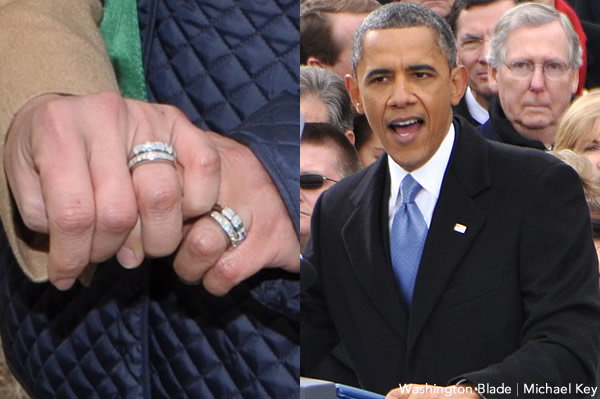
(Washington Blade photos by Michael Key)
There are signs that President Obama will include relief for bi-national same-sex couples as part of his proposals for comprehensive immigration reform, but whether the Senate will agree to such language as part of bipartisan compromise legislation remains an open question.
Shin Inouye, a White House spokesperson, declined to preview whether Obama will include a provision for bi-national same-sex couples as part of his highly anticipated proposal for immigration reform, but maintained the president is committed to bi-national same-sex couples.
“The president has made it clear on a number of occasions that comprehensive immigration reform is a key priority, including in major speeches over the last four years,” Inouye said. “While I’m not going to preview the president’s proposal, he has long believed that Americans with same-sex partners from other countries should not be faced with the painful choice between staying with the person they love or staying in the country they love, and he welcomes changes that would help keep families together.”
Although not a commitment, that response is the strongest on-the-record statement yet from a White House official on Obama’s support for bi-national couples and whether he’ll seek language to include them as part of his immigration reform plan.
Unlike straight Americans in opposite-sex marriages, gay Americans are unable to sponsor their foreign partners for residency in the United States because they can’t marry in most states and in states where they can, the Obama administration continues to deny marriage-based green card applications because of the Defense of Marriage Act.
Current law could lead to separation for many bi-national same-sex couples — and in some extreme cases deportation of the foreign national in the relationship if they lose their immigration status. Standalone legislation that would address this issue is known as the Uniting American Families Act.
According to a November 2011 report from the Williams Institute, there are an estimated 28,500 bi-national same-sex couples and nearly 11,500 same-sex couples in which neither partner is a U.S. citizen — making for a total of 40,000 couples that are ineligible to take advantage of immigration preferences available to different-sex spouses.
LGBT advocates have been calling on the Obama administration and Congress to address the issue as part of comprehensive immigration reform. While such legislation didn’t move during the first four years of the administration, Obama has pledged to take the lead on reform at the start of his second term.
Obama emphasized that he would pursue comprehensive immigration reform last month during an interview on NBC’s “Meet the Press,” saying, “I’ve said that fixing our broken immigration system is a top priority. I will introduce legislation in the first year to get that done.”
According to a report in the New York Times earlier this month, Obama plans to push Congress to enact a massive overhaul of the immigration system — a large proposal as opposed to a series of separate bills — that would include a path to citizenship for most of the 11 million undocumented immigrants in the country. Additionally, it would set up a nationwide verification system of legal status for all newly hired workers; add visas to relieve backlogs and allow skilled immigrants to stay in the country; and create a guest-worker program to attract low-wage immigrants in the future.
That proposal could be made public in the coming weeks. The Times reported that Obama may elect to lay out his plan in the upcoming State of the Union address. U.S. House Speaker John Boehner (R-Ohio) invited Obama to deliver the address before a joint session of Congress on Feb. 12.
LGBT advocates, including some who spoke to the Washington Blade on condition of anonymity, said they fully expect Obama to include language for bi-national same-sex couples as part of his plan for immigration overhaul. One anonymous advocate said the Obama administration has given them “positive feedback” on an LGBT-inclusive proposal.
Steve Ralls, a spokesperson for Immigration Equality, was among those expressing confidence that Obama would choose to include UAFA in any immigration package that he would propose to Congress.
“Immigration Equality has been very encouraged by our ongoing conversations with the administration,” Ralls said. “We believe the president and his team will help craft and pass a bill that keeps families, gay and straight, together. We are looking forward to the president outlining his vision for reform in the coming weeks, and we take him at his word that keeping LGBT families together is a goal we all share.”
Calls on Obama to address this issue in his immigration plan are concurrent with calls on him to take administrative action. LGBT rights supporters — most recently Sen. Kirsten Gillibrand, who a led a group of 13 senators in a letter to the administration — are asking the Department of Homeland Security to hold in abeyance marriage-based green card applications for bi-national couples as a temporary solution to ensure they won’t be separated. The Obama administration has responded by saying it must continue to enforce DOMA and continues to deny these applications.
Still, the Obama administration has taken steps to address this issue, but nothing has been codified into law. In October, the Department of Homeland Security issued guidance stipulating immigration officers should consider “long-term, same-sex partners” as families when considering whether to exercise prosecutorial discretion in the potential deportation of an undocumented immigrant.
Will Senate agree to UAFA-inclusive package?
But while signs indicate that Obama will ask Congress to pass a UAFA-inclusive immigration reform bill, questions linger over whether the Senate will come to an agreement to pass an immigration package that would protect LGBT families.
Concurrent with the plan the White House is developing, a bipartisan group of senators has engaged in talks to craft a comprehensive bill that, according to the Times, could be introduced as early as March with the plan to hold a floor vote before August. Legislation is expected to start in the Democratic-controlled Senate before moving over the Republican-controlled House for final passage.
Sen. Chuck Schumer (D-N.Y.), who has championed the legislation in the past, is the lead Democrat involved with the talks, while Sen. Lindsey Graham (R-S.C.) is the lead Republican. Others reportedly involved in the talks are Sens. Michael Bennet (D-Colo.), Bob Menendez (D-N.J.) and Richard Durbin (D-Ill.) on the Democratic side and Sens. John McCain (R-Ariz.), Marco Rubio (R-Fla.) and Mike Lee (R-Utah) on the Republican side.
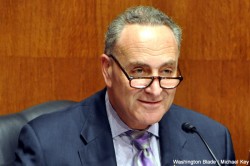
Sen. Chuck Schumer (D-N.Y.) (Washington Blade file photo by Michael Key)
Many Capitol Hill sources said it’s simply too early in the process to determine whether the agreement in the Senate would include UAFA. But one anonymous LGBT advocate said he doesn’t expect the Senate to come up with a proposal that includes UAFA because whatever agreement is concocted must meet the approval of the Republicans involved in the talks, and they won’t be keen on agreeing to explicit LGBT provisions.
In the Human Rights Campaign’s most recent scorecard for the 112th Congress, Republicans involved in the discussions didn’t have strong scores. Lee scored 40, Rubio scored 47 while both McCain and Graham earned low scores of 15. None of the offices of the senators involved in the talks — Democratic or Republican — responded to the Washington Blade’s request for comment on including UAFA in their agreement.
That doesn’t even take into account the chances of passing an LGBT-inclusive bill in the House. Last year, the Senate was able to pass an LGBT-inclusive reauthorization of the Violence Against Women Act, but the version the House passed lacked such language.
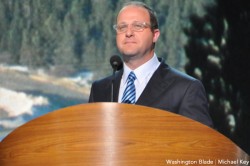
Rep. Jared Polis (D-Colo.) says immigration reform will be ‘very difficult to pass.’ (Washington Blade photo by Michael Key)
Gay Rep. Jared Polis (D-Colo.), who’s also been a leading advocate of immigration reform, remains skeptical about the prospects for passing immigration reform this Congress — with or without inclusion of UAFA.
“Immigration reform is going to be very difficult to pass,” Polis said. “The consideration of LGBT families is one of the less controversial aspects. The most controversial aspect is the treatment of the 10 to 15 million people who are already here illegally. So, it’s going to be difficult to get it through. If there is a vehicle to pass immigration reform, I’m going to work hard and I know that Sen. Schumer is also committed to immigration equality for gay and lesbian families.”
Immigration Equality’s Ralls said he’s “increasingly optimistic” that senators would agree to a proposal that would include a provision for bi-national couples — particularly if Obama exercises leadership by including such language in his proposal to Congress.
And in a video report produced by Raw Story earlier this month, a Schumer staffer told a dozen same-sex couples and activists who came to his New York City office that the senator believes UAFA should be part of comprehensive immigration reform. The staffer was later identified as Nick Martin, Schumer’s director of intergovernmental relations.
“He is a co-sponsor of UAFA,” the staffer said. “It is part of his vision for what the comprehensive immigration bill will — it will be included in that. I don’t think the issue is — we’ve quite gotten to that issue yet. We’re really focused right now in terms of a path to citizenship. But it is a key issue for him to get to that as part of that process.”
An earlier version of comprehensive immigration reform introduced by Menendez in the 111th and 112th Congress included UAFA-like language, but that legislation had only Democratic co-sponsors and saw no movement.
In any event, members of Congress still plan on moving forward with standalone legislation that would enable gay Americans to sponsor their foreign partners for residency in the United States. In the past, the bill has been introduced by Rep. Jerrold Nadler (D-N.Y.) in the House and Senate Judiciary Chair Patrick Leahy (D-Vt.) in the Senate.
“Fairness in our immigration laws for all Americans and their loved ones is of the utmost importance, and in pursuit of that, I look forward to again introducing the Uniting American Families Act early this year,” Leahy said in a statement to the Blade. “I was proud to have a bipartisan bill in the last Congress, and I look forward to working with members from both parties on this issue this year.”
Another key question is whether a provision for bi-national couples is even necessary as part of comprehensive immigration reform if DOMA is struck down by the Supreme Court before the end of June. Justices are weighing a challenge to the anti-gay statute known as Windsor v. United States.
That decision could remove a major barrier for bi-national same-sex couples. Without DOMA, the administration would no longer have an excuse for denying marriage-based green card applications for same-sex couples. Gay Americans who are married to foreign same-sex partners would logically be able to sponsor their partners for residency in the United States.
The sentiment that UAFA will be unnecessary if the court strikes down DOMA was held by Polis, who said the court would be the source of relief for bi-national couples, not legislation.
“Keep in mind one thing, there’s also the pending Supreme Court case, where if DOMA is invalidated, there will not need to be special consideration in the law,” Polis said. “Gay and lesbian marriages would simply be allowed for immigration purposes. So, that’s also happening concurrent with this debate about immigration reform.”
But Ralls said UAFA-inclusive immigration reform is still necessary. First, he noted the court is unpredictable and there’s no guarantee that justices will deliver a ruling in a few months that will be favorable to bi-national couples.
“UAFA in immigration reform is a critical safety net for all couples, should the court not rule favorably,” Ralls said. “Until there is a Supreme Court ruling striking down DOMA once and for all, we are committed to pursuing every possible avenue — in Congress and administratively — to protect the families we represent.”
Further, Ralls said striking down DOMA would not have an impact on all same-sex bi-national couples, such as couples where one spouse is a recent asylee.
Straight asylum seekers who leave a spouse behind in the country of persecution can immediately file to bring a spouse to the United States after winning asylum here. But countries that persecute gays aren’t likely to have marriage equality laws, so the gay asylee would not have been able to marry a partner before fleeing. Even without DOMA, such a gay asylee would have to naturalize — which would take more than five years after arriving in the United States — before that person could sponsor a partner on a visa.
“Of course, the end of DOMA would be a terrific solution for bi-national couples, but until we have that ruling in hand, we are committed to pursuing other options — like inclusive immigration reform — which will give all couples access to a green card,” Ralls concluded.
The White House
USCIS announces it now only recognizes ‘two biological sexes’
Immigration agency announced it has implemented Trump executive order

U.S. Citizenship and Immigration Services on Wednesday announced it now only “recognizes two biological sexes, male and female.”
A press release notes this change to its policies is “consistent with” the “Defending Women from Gender Ideology Extremism and Restoring Biological Truth to the Federal Government” executive order that President Donald Trump signed shortly after he took office for the second time on Jan. 20.
“There are only two sexes — male and female,” said DHS spokesperson Tricia McLaughlin in a statement. “President Trump promised the American people a revolution of common sense, and that includes making sure that the policy of the U.S. government agrees with simple biological reality.”
“Proper management of our immigration system is a matter of national security, not a place to promote and coddle an ideology that permanently harms children and robs real women of their dignity, safety, and well-being,” she added.
The press release notes USCIS “considers a person’s sex as that which is generally evidenced on the birth certificate issued at or nearest to the time of birth.”
“If the birth certificate issued at or nearest to the time of birth indicates a sex other than male or female, USCIS will base the determination of sex on secondary evidence,” it reads.
The USCIS Policy Manuel defines “secondary evidence” as “evidence that may demonstrate a fact is more likely than not true, but the evidence does not derive from a primary, authoritative source.”
“Records maintained by religious or faith-based organizations showing that a person was divorced at a certain time are an example of secondary evidence of the divorce,” it says.
USCIS in its press release notes it “will not deny benefits solely because the benefit requestor did not properly indicate his or her sex.”
“This is a cruel and unnecessary policy that puts transgender, nonbinary, and intersex immigrants in danger,” said Immigration Equality Law and Policy Director Bridget Crawford on Wednesday. “The U.S. government is now forcing people to carry identity documents that do not reflect who they are, opening them up to increased discrimination, harassment, and violence. This policy does not just impact individuals — it affects their ability to travel, work, access healthcare, and live their lives authentically.”
“By denying trans people the right to self-select their gender, the government is making it harder for them to exist safely and with dignity,” added Crawford. “This is not about ‘common sense’—it is about erasing an entire community from the legal landscape. Transgender, nonbinary, and intersex people have always existed, and they deserve to have their identities fully recognized and respected. We will continue to fight for the rights of our clients and for the reversal of this discriminatory policy.”
Federal Government
Mass HHS layoffs include HIV/AIDS prevention, policy teams
Democratic states sue over cuts

Tuesday began a series of mass layoffs targeting staff, departments, and whole agencies within the U.S. Department of Health and Human Services under Secretary Robert F. Kennedy Jr., who reportedly plans to cut a total of 10,000 jobs.
On the chopping block, according to reports this week, is the Office of Infectious Disease and HIV/AIDS Policy. A fact sheet explaining on the restructuring says “a new Administration for a Healthy America (AHA) will consolidate the OASH, HRSA, SAMHSA, ATSDR, and NIOSH, so as to more efficiently coordinate chronic care and disease prevention programs and harmonize health resources to low-income Americans.”
The document indicates that “Divisions of AHA include Primary Care, Maternal and Child Health, Mental Health, Environmental Health, HIV/AIDS, and Workforce, with support of the U.S. Surgeon General and Policy team.”
“Today, the Trump administration eliminated the staff of several CDC HIV prevention offices, including entire offices conducting public health communication campaigns, modeling and behavioral surveillance, capacity building, and non-lab research,” said a press release Tuesday by the HIV + Hepatitis Policy Institute.
The organization also noted the “reassignments” of Jonathan Mermin, director of the National Center for HIV, Viral Hepatitis, STD, and TB Prevention, and Jeanne Marrazzo, director of the National Institutes of Health’s National Institute of Allergy and Infectious Diseases. Both were moved to the Indian Health Service.
“In a matter of just a couple days, we are losing our nation’s ability to prevent HIV,” said HIV + Hepatitis Policy Institute Executive Director Carl Schmid. “The expertise of the staff, along with their decades of leadership, has now been destroyed and cannot be replaced. We will feel the impacts of these decisions for years to come and it will certainly, sadly, translate into an increase in new HIV infections and higher medical costs.”
The group added, “We are still learning the full extent of the staff cuts and do not know how the administration’s announced reorganization of HHS will impact all HIV treatment, prevention, and research programs, including President Trump’s Ending the HIV Epidemic initiative,” but “At the moment, it seems that we are in the middle of a hurricane and just waiting for the next shoe to drop.”
A group of 500 HIV advocates announced a rally planned for Wednesday morning at 8 a.m., at the U.S. Capitol lawn across from the Cannon House Office Building, which aims to urge Congress to help stop the cuts at HHS.
“Over 500 advocates will rally on Capitol Hill and meet with members of Congress and Hill staff to advocate for maintaining a strong HIV response and detail the potential impact of cuts to and reorganization of HIV prevention and treatment programs,” the groups wrote.
The press release continued, “HHS has stated that it is seeking to cut 10,000 employees, among them 2,400 CDC employees, many doing critical HIV work. It also seeks to merge HIV treatment programming into a new agency raising concerns about maintaining resources for and achieving the outstanding outcomes of the Ryan White HIV/AIDS Program.”
On Tuesday a group of Democratic governors and attorneys general from 23 states and D.C. filed a lawsuit against HHS and Kennedy seeking a temporary restraining order and injunctive relief to halt the funding cuts.
U.S. Centers for Disease Control and Prevention withdrew approximately $11.4 billion in funding for state and community health departments during the COVID-19 pandemic response, along with $1 billion to the Substance Abuse and Mental Health Services Administration.
“Slashing this funding now will reverse our progress on the opioid crisis, throw our mental health systems into chaos, and leave hospitals struggling to care for patients,” New York Attorney General Letitia James said.
State Department
Former US envoy for global LGBTQ, intersex rights slams Trump
Former President Joe Biden appointed Jessica Stern in 2021
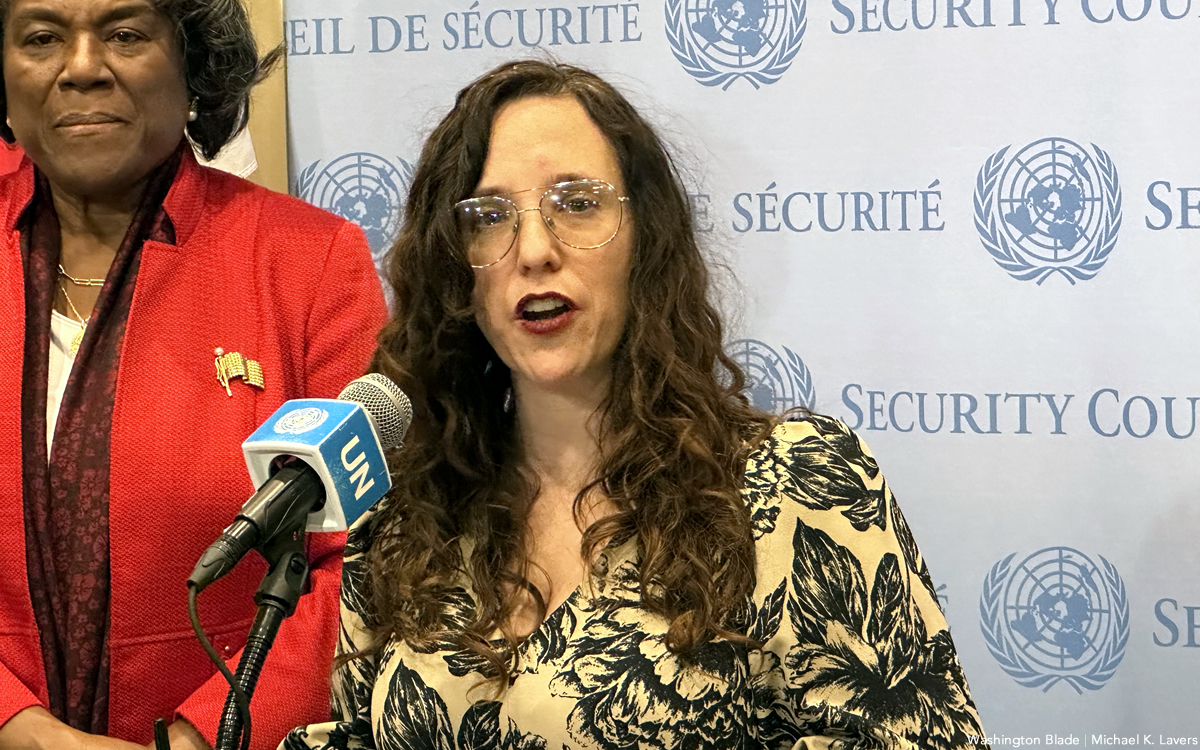
Jessica Stern, the former special U.S. envoy for the promotion of LGBTQ and intersex rights, says the work that she and her colleagues did under the Biden-Harris administration is “being systematically dismantled.”
“As the person who was responsible for leading U.S. foreign policy on LGBTQI+ issues, it’s been very difficult for the past two months to see that work being systematically dismantled,” she told the Washington Blade on March 19 during a telephone interview.
Stern was the executive director of Outright International, a global LGBTQ and intersex advocacy group, when then-President Joe Biden appointed her in June 2021.
The promotion of LGBTQ and intersex rights was a cornerstone of the Biden-Harris administration’s overall foreign policy. These efforts specifically included the decriminalization of consensual same-sex sexual relations and marriage equality efforts in countries where activists said they were possible through the legislative or judicial processes.
The Trump-Vance administration’s decision to freeze most U.S. foreign aid spending for at least 90 days has had a devastating impact on the global LGBTQ and intersex rights movement. President Donald Trump’s executive order that bans the State Department from issuing passports with “X” gender markers has prompted Germany and several other European countries to issue travel advisories for transgender and nonbinary people who are planning to visit the U.S.
Stern said the Trump-Vance administration “has studied the anti-LGBTQI strategies of other countries and basically imported the worst ideas from around the world: The most violent, the most dehumanizing, the most targeting strategies.” Stern added these policies have emboldened Hungarian Prime Minister Viktor Orbán, Russian President Vladimir Putin, Argentine President Javier Milei and other anti-LGBTQ heads of state.
“It’s one thing when a small country that has limited global reach implements anti-LGBTQI laws and policies. It’s another thing when one of the world’s superpowers does so,” Stern told the Blade. “There’s no question that the U.S.’s regression on LGBTQI rights is actually going to accelerate backlash against LGBTQI people around the world.”
“We provide political legitimacy to those ideas, but also we’re forging new alliances and coalitions, and we’re pushing these ideas on other countries,” she added. “So, it’s not a passive action. The U.S. government currently is actively funding and disseminating anti-LGBTQI hatred around the world.”
Former State Department colleagues ‘afraid every day’
The Trump-Vance administration in a Feb. 3 statement that defended its efforts to dismantle the U.S. Agency for International Development noted examples of the organization’s “waste and abuse” included $2 million for “sex changes and ‘LGBT activism'” in Guatemala and $1.5 million to “advance diversity, equity and inclusion in Serbia’s workplaces and business communities.” Secretary of State Marco Rubio last month said 83 percent of USAID contracts have been cancelled, and the remaining will “now be administered more effectively under the State Department.”
Rubio after the Trump-Vance administration froze nearly all U.S. foreign aid spending issued a waiver that allowed the President’s Emergency Plan for AIDS Relief and other “life-saving humanitarian assistance” programs to continue to operate.
The Blade has previously reported PEPFAR-funded programs in Kenya, South Africa, and elsewhere have suspended services and even shut down because of a lack of U.S. funding. UNAIDS Executive Director Winnie Byanyima on March 24 said 6.3 million more people around the world will die of AIDS-related complications over the next four years if the U.S. does not fully restore its foreign assistance.
Stern said her former State Department colleagues are “afraid every day.”
“They never know, ‘Am I going to be fired today?’ “Am I going to be put on administrative leave?’,” she said. “I cannot even imagine what it’s like to go to work every day.”
Stern told the Blade her former colleagues tell her that “there’s not a lot of foreign policy work happening because there’s so much disruption being caused by DOGE (the Department of Government Efficiency).”
“Entire departments have been decimated,” she said, noting one of them has lost 60 people. “It’s almost inconceivable to figure out how to restructure your work when your resources have been decimated.”
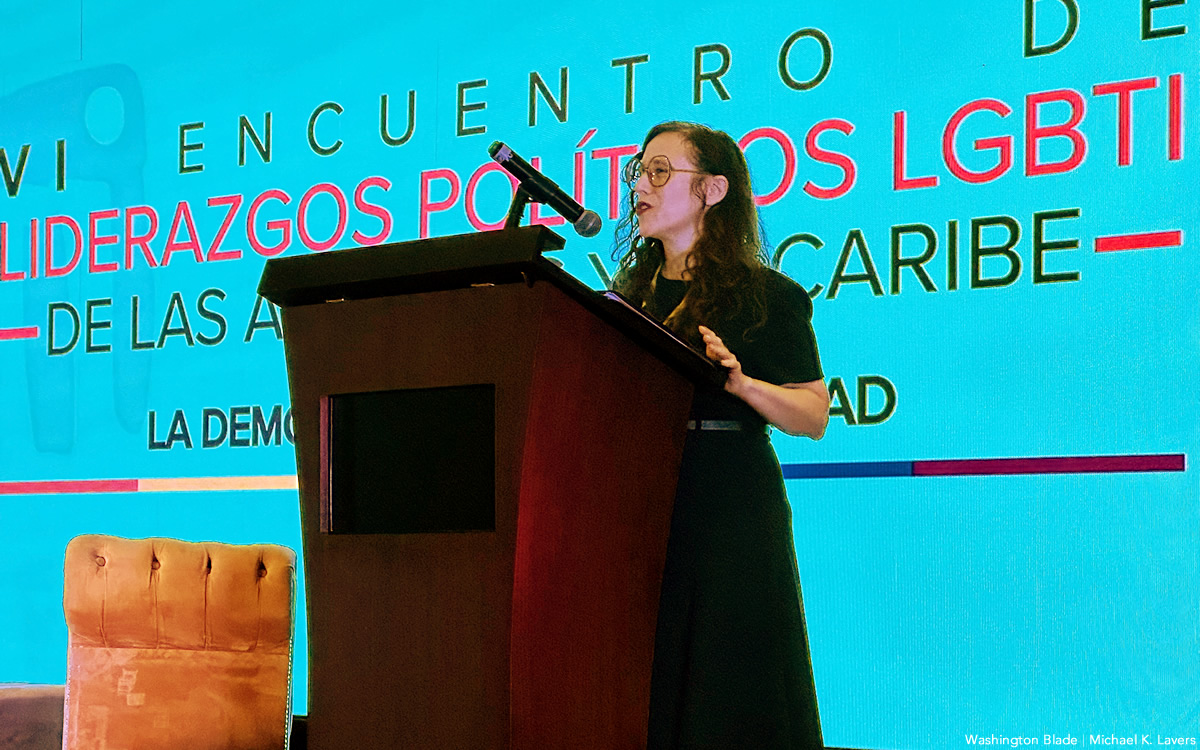
Stern described herself as “an eternal optimist” when the Blade asked whether she thinks the U.S. can ever stand for LGBTQ and intersex rights abroad.
“You have to believe in human rights,” she said.
Stern said former Secretary of State Antony Blinken as “an ally on LGBTQI issues.” Stern also said many of her now former State Department colleagues thanked her and her team for their work before they left government.
“There’s so much compassion from straight and cisgendered allies, from career officials, people that are not human rights experts or specialists, people that don’t focus on the well-being of LGBTQI people, but people that care very much about the United States standing for its values, the rule of law, equality for all, and this notion that it is in our national interest to ensure that there is safety, prosperity, and well-being for people around the world,” she said.
“The situation we find ourselves in will not last forever,” added Stern. “What we have to do is figure out how to hold the line right now, and how to organize for the future.”
She stressed ways to “hold the line” include litigation, protests, letters-to-the-editor, demanding accountability from lawmakers.
“There’s so much to do,” said Stern.
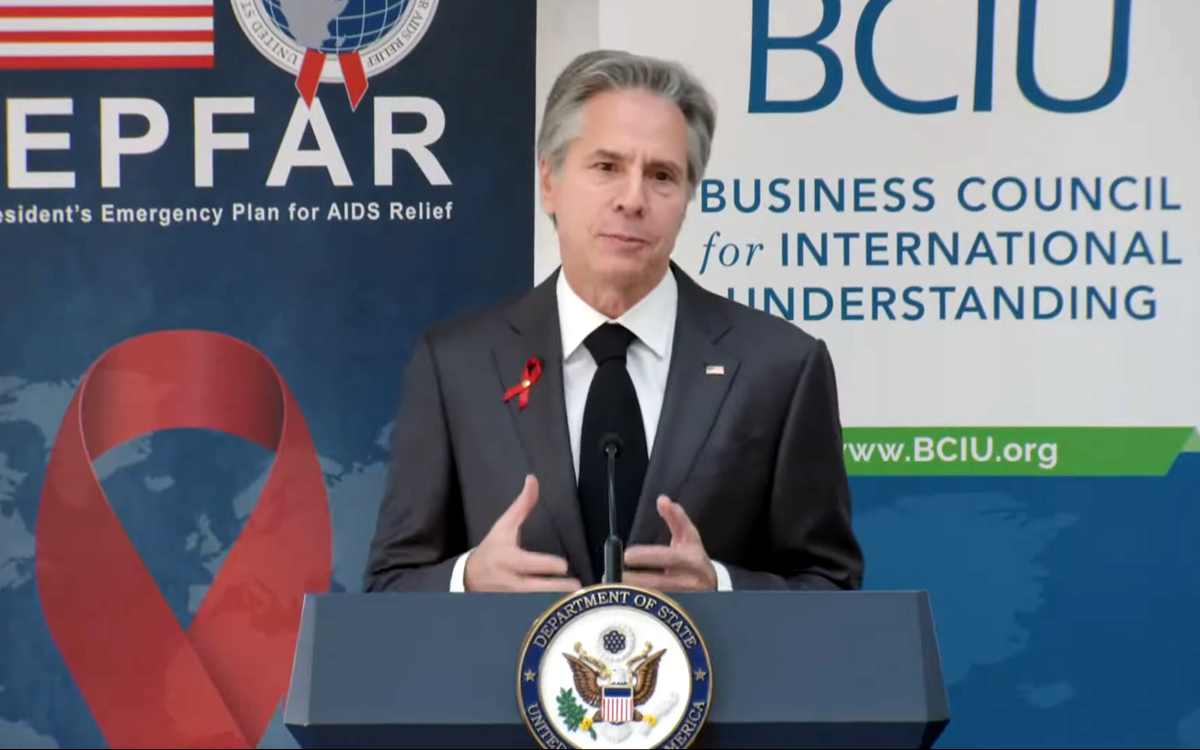
Stern is currently teaching at Columbia University’s School of International and Public Affairs, and is writing about her experience as the “first-ever human rights expert to be the special U.S. envoy for LGBTQI rights.” Stern also told the Blade that she is working to launch a new organization.
“I love being an activist again,” she said. “If there was ever a time when activists are needed, it’s now.”
“I am really proud to have rejoined the resistance,” added Stern.
-

 Movies4 days ago
Movies4 days agoSexy small town secrets surface in twisty French ‘Misericordia’
-

 The White House3 days ago
The White House3 days agoUSCIS announces it now only recognizes ‘two biological sexes’
-

 Federal Government5 days ago
Federal Government5 days agoMass HHS layoffs include HIV/AIDS prevention, policy teams
-

 Argentina4 days ago
Argentina4 days agoLGBTQ seniors in Argentina face uncertain future










